A night guard redistributes the intense force generated by teeth grinding, serving as a barrier between upper and lower teeth to protect the tooth surface, aligning the jaw to relieve TMJ issues, and relaxing jaw and facial muscles.
Has someone told you that you grind your teeth in your sleep? Do you often end up with a headache or troubling jaw pain because you clench your teeth? A night guard may be what you need!
A night guard (also called a bite splint) is a dental appliance that helps protect your teeth from the damaging effects of nighttime teeth grinding and jaw clenching.
The unassuming dental appliances play a vital role in preventing excessive wear of teeth and provide relief from pain in the jaw, face, and neck.
This article will examine each of these functions in detail. At the end of this article, you’ll know how to fight uncontrolled teeth clenching during sleep.
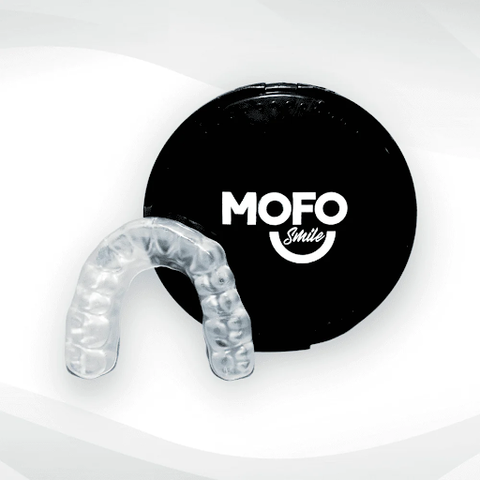
HOW DOES A NIGHT GUARD WORK?
A night guard works by protecting your teeth, gums, and surrounding muscles from unnecessary tension due to teeth grinding and clenching.
It does this in the following ways:
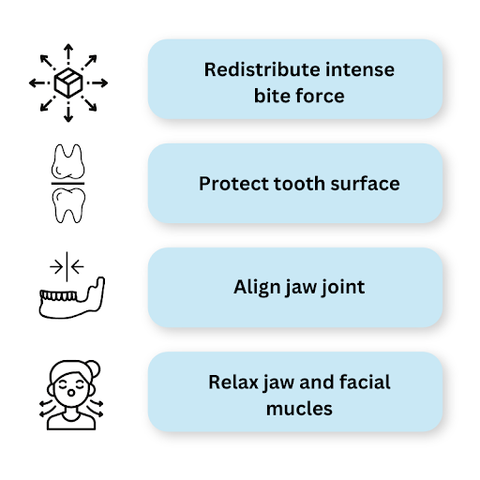
REDISTRIBUTING INTENSE BITE FORCE
One way night guards work is to redistribute the enormous force that is transmitted to the teeth and jaws when your upper and lower teeth hammer on each other during involuntary teeth grinding (bruxism) or jaw clenching.
Do you know people suffering from bruxism can grit and grind their teeth with as much as 250 pounds (113.4 kg) of force?
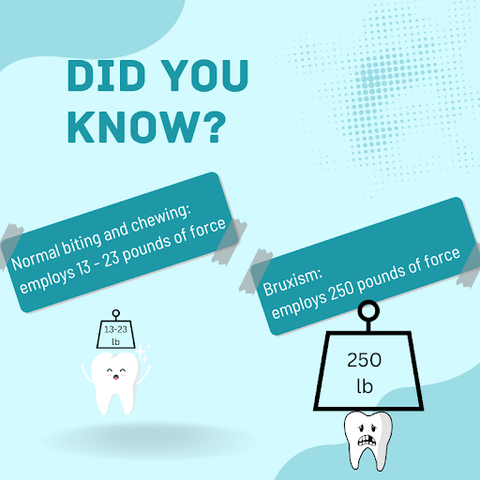
To put this into perspective, normal biting and chewing generate forces between 13 – 23 pounds.
This intense force employed when you grind or clench your teeth can put excessive strain on your teeth, jaw joints, and surrounding muscles, leading to teeth wear, jaw pain, temporomandibular joint (TMJ) disorders, and tension headaches.
Night guards protect the teeth by reducing the force transmitted to the teeth when you grind and clench in your sleep.
It does this by absorbing the impact of biting and clenching and redistributing the force evenly throughout the guard. This reduces the intensity of the force transmitted to the teeth and jaws.
With the teeth and jaws receiving less force, less strain is put on them, thereby protecting them from excessive wear and damage.
PROTECTING TOOTH SURFACE
Another way night guards work is by serving as a cushioning barrier between your upper and lower teeth that protects the tooth surface by preventing direct contact between the two sets of teeth during grinding and clenching.
Do you know that our teeth wear down? You might not notice it, but your teeth wear down from different processes. One of these is attrition – the effect of tooth to tooth contact.
The direct contact between the top and bottom teeth from everyday biting and chewing makes teeth wear down with time. However, bruxism can cause more rapid dental attrition.
Because bruxism generates more than ten times the force of normal biting and chewing, tooth-to-tooth contact from grinding and clenching causes excessive tooth wear.
In fact, people who grind and clench their teeth can experience up to 2mm enamel erosion by their 20s.
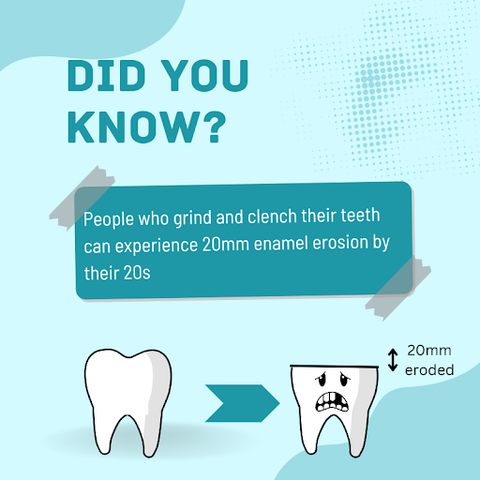
This is where night guards come in!
Night guards are made of semi-soft materials like acrylic or silicone and come in full arch designs (meaning they cover all of either the upper or lower teeth).
Wearing a night guard over your upper teeth creates a protective barrier between your lower and upper teeth. This barrier prevents direct contact between your teeth when you grind or clench teeth, minimizing the wear and tear caused by grinding or clenching.
ALIGNING YOUR JAW JOINT
Another way night guards work is by affecting the position of your jaws when you sleep to help relax your jaw muscles and relieve temporomandibular joint (TMJ) issues.
The temporomandibular joints are the two joints that connect the lower jaw to the skull. They consist of the temporal bone (the side and base of the skull) and the mandible (the lower jaw).
These joints allow the lower jaw to move up and down, forward and backwards, and side to side. So, when properly aligned, smooth muscle actions (like chewing, swallowing, yawning, and talking) occur.
But when they are not aligned, several problems may occur, including jaw discomfort and facial pain.
Habitual involuntary teeth grinding and clenching during sleep can strain jaw joints and muscles excessively. This can cause a misaligned jaw, which leads to temporomandibular joint (TMJ) disorder.
This is where night guards come in! A night guard helps position your jaw in a stable and aligned position when you sleep, reducing symptoms of temporomandibular joint disorder.
You may also like: 5 Best Mouth Guards For TMJ (Ranked!)
RELAXING YOUR JAW AND FACIAL MUSCLES
Dental night guards create a separation between your upper and lower teeth and lessen the pressure on the jaw, helping your jaw muscles relax and alleviate symptoms of bruxism (such as muscle soreness).
Involuntary clenching of your teeth tightly makes the muscles in your jaws tense.
A dental night guard is the superhero your jaw needs in this situation, as its functioning helps diffuse the immense pressure on the jaw joints and surrounding muscles.
By providing a barrier between your lower and upper teeth, the night guard breaks the cycle of jaw clenching. The reduction in muscle activity gives the jaw muscles a chance to relax.
By redistributing the pressure generated by grinding and clenching, the dental night guard prevents specific areas from experiencing concentrated pressure. Since concentrated pressure often leads to muscle tension, breaking it up promotes jaw muscle relaxation.
WHAT ARE THE ADVANTAGES OF NIGHT GUARDS?
Like a mouth guard, a night guard is a dental appliance that can be used to protect your teeth. Sleeping with a night guard has several advantages for people suffering from bruxism (teeth grinding), clenching, and related dental issues.
Specifically, night guards do the following:
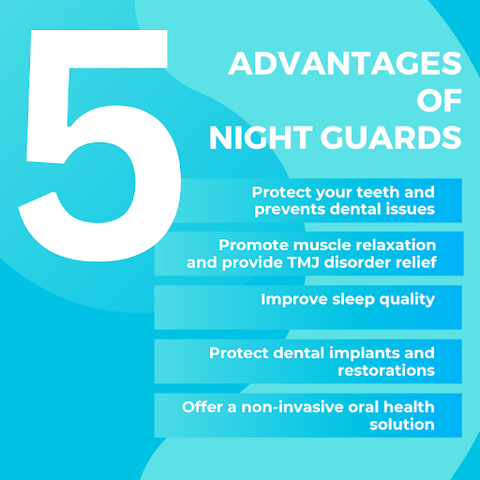
PROTECTS YOUR TEETH AND PREVENTS DENTAL ISSUES
A night guard is a dental appliance whose primary function is to protect the teeth from the damaging effect of bruxism. The intense force generated by grinding teeth causes tooth fractures and wear and increases the risk of cavities.
Wearing a night guard protects your teeth from these dental damaging habits and more.
In fact, a night guard prevents a range of dental issues and contributes to overall dental health.
PROMOTE MUSCLE RELAXATION AND PROVIDE TMJ DISORDER RELIEF
Bruxism and clenching put a lot of pressure on jaw joints and muscles, which can cause jaw pain and temporomandibular joint disorder. The dental guard provides a protective barrier between teeth that reduces bite force.
This decreases muscle tension, alleviating the discomfort associated with bruxism and jaw clenching.
IMPROVES SLEEP QUALITY
A night guard can be employed in treating sleep apnea (especially when it is associated with bruxism) and can also improve sleep quality.
Teeth grinding and clenching can disrupt sleep patterns. In fact, many people with bruxism may not know it until they begin to suffer sleep disruptions.
Clenching your teeth while you sleep narrows your airway, preventing you from breathing properly. This causes obstructive sleep apnea, which may lead to snoring and frequent awakenings.
A night guard provides a barrier that separates your top and bottom jaw. This gives you better sleep as it opens up your airways and allows you to breathe well while you sleep.
PROTECT DENTAL IMPLANTS AND RESTORATIONS
Night guards can protect your valuable dental investments if you have undergone dental treatment such as implants and aesthetic restorations.
Bruxism and jaw clenching can destroy several dental treatments. The enormous force employed when grinding teeth can weaken dental implants and other dental restorations like crowns, veneers, and bridges.
A night guard can save dental restoration by serving as a protective barrier between teeth and reducing the force transmitted to the teeth.
Read Also: Can I Wear A Night Guard Over A Crown?
NIGHT GUARDS OFFER A NON-INVASIVE ORAL HEALTH SOLUTION
By protecting teeth and preventing dental issues due to teeth grinding and clenching, night guards contribute to the long-term health of your teeth, gum, and oral structures.
Importantly, it is a non-invasive solution that offers zero pain and significantly less discomfort than going without a night guard.
Ordering a custom night guard makes using the dental appliance more comfortable.
A custom-fitted night guard is designed for your unique dental anatomy, so it fits your teeth snugly and does not interfere with your breathing or sleeping.
WHAT ARE THE DISADVANTAGES OF A NIGHT GUARD?
While night guards offer many advantages to people with bruxism and related dental issues, they come with a few disadvantages. These include:
ADJUSTMENT PERIOD
When starting to wear a night guard, the device will feel strange in your mouth. So, you’ll need an adjustment period to get used to wearing the night guard.
The adjustment period for custom-made night and mouth guards is smaller than for over-the-counter (OTC) ones.
This is because OTC night guards are made to fit a broader range of mouth sizes, are relatively bigger, and are not professionally adjusted to fit your exact tooth structure.
Wanting a shorter adjustment period?
REQUIRES MAINTENANCE AND CLEANING
Your night guard requires regular maintenance and cleaning because bacteria from your mouth can build up on it. Bacteria buildup can cause a night guard to smell, and using a night guard that is unclean may increase risk of oral infection.
This can be cumbersome for some people.
Maintenance that your night guard will require includes:
- Rinse the night guard with lukewarm water immediately after you take it out of your mouth.
- Occasionally use a soft toothbrush and gentle toothpaste to clean the night guard.
- Air dry the night guard. Avoid drying it by blowing air from your mouth, as that may transfer bacteria to it.
ADDITIONAL COST
Like every other dental appliance, night guards have cost implications. While you should see the cost of a night guard as a good investment for your overall dental health, it can get high.
You can save cost on night guards (bruxism mouth guards) by ordering online instead of going to a dental office for your guard.
Online night guards are cheaper because they are lab-to-user, eliminating the need for a dentist middleman.
You may also like: How Much Does A Night Guard Cost in Australia?
MASKING UNDERLYING PROBLEMS
Night guards effectively manage the symptoms of uncontrolled teeth grinding and clenching. However, these dental appliances do not address the root cause of the problem.
Factors that may increase your chance of developing bruxism include:
- Intense emotions. Stress, anxiety, anger, and frustration can make people grind their teeth uncontrollably.
- Personality type. Individuals who are aggressive, hyperactive, and very competitive are more likely to experience bruxism.
- Medication and substance use. Taking certain psychiatric medications, using tobacco, and taking alcohol or caffeine can increase the risk of bruxism.
- Other health conditions. Conditions like sleep apnea, attention deficit disorder, and more are associated with bruxism.
Since a night guard does not address these root causes of bruxism, it may delay seeking more comprehensive treatment for underlying problems.
TAKEAWAY: EFFECTIVELY PROTECT YOUR TEETH FROM UNCONTROLLED GRINDING AND CLENCHING WITH MYMOFOSMILE NIGHT GUARD
A night guard protects your teeth from uncontrolled teeth grinding when sleeping (bruxism), saving you from bruxism-related issues like pain in the temporomandibular joint, severe headaches, etc.
Wondering where you can get the highest quality night guards to protect your teeth from uncontrolled grinding and related issues? MYMOFOSMILE is the answer.
MYMOFOSMILE night guards are dentist-grade night guards. They protect against teeth grinding and clenching effectively, leading to a better night’s sleep.
They are custom-made for your teeth, ensuring you’ll quickly adjust to using them and find them comfortable to wear.
Look and feel at your best, even at sleep.



